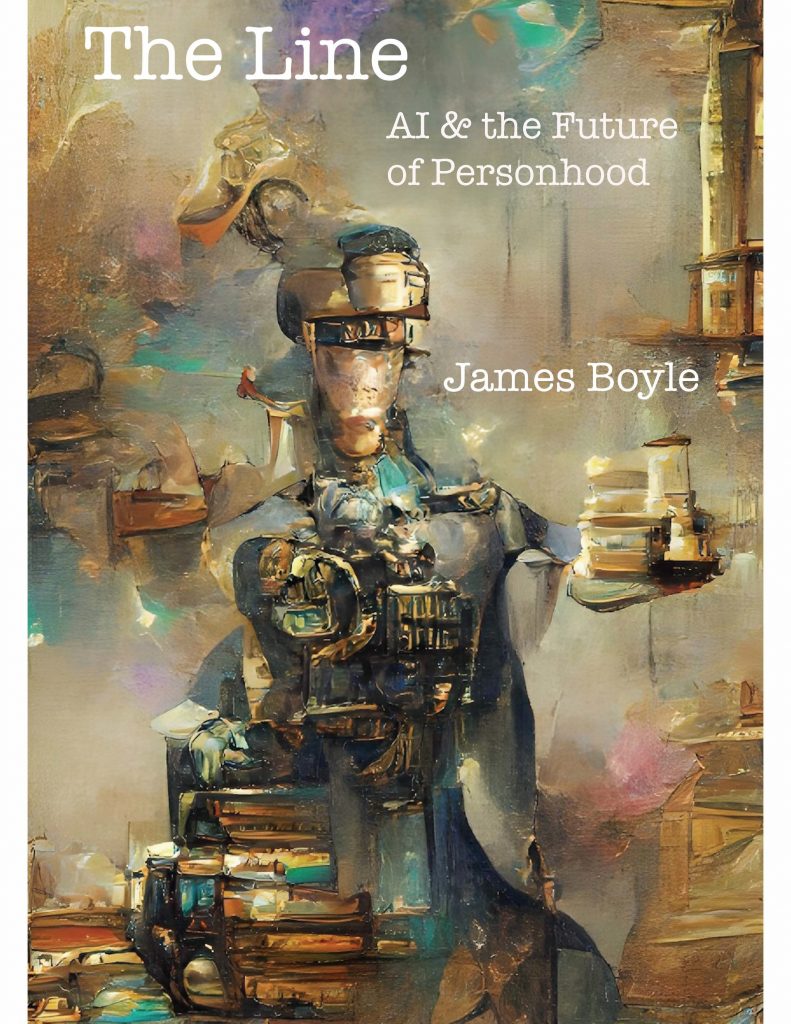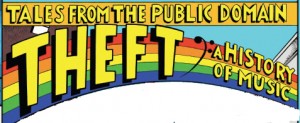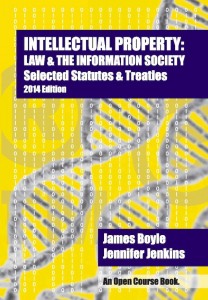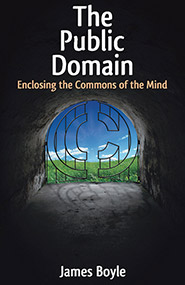My book is now available in a Kindle edition I have mixed feelings about it Like any author I am delighted to sell books, in any format. Lots of people e-mailed me asking for a Kindle version, even knowing that there was a free CC licensed edition, and I passed those requests on to Yale. I am pleased that this book has sold pretty well because I think it encourages Yale University Press and other presses to allow authors to make Creative Commons licensed versions available. So I am glad that it looks like the book is going to make Yale a profit and if Kindle-edition sales help to do that, great! I am also not a book-Luddite. Though I love paper books, I am not prejudiced against the e-book. Finally, I like the technology. The Kindle is breathtaking to see in action
. In terms of size, features and legibility — check out the video of reading it in full sun — it seems to have hit the spot. I love to read, and I am a very fast reader. For a flight to Europe I have to take 2 or 3 books. To have 1500 books available in something smaller than an average paperback would be wonderful. To be able to download any book out of the more than 200,000 available on Amazon while you were on a train or standing on a street corner would be great.
So far, I sound just like Amazon’s ads. But then there is the DRM (Digital Rights Management.) With the Kindle you give up a series of vitally important features that a paper book has.
1.) Your library depends on Amazon — if the Kindle is discontinued and your Kindle breaks… your books literally evaporate. And don’t say it couldn’t happen. Microsoft and Google have both discontinued widely touted DRM protected music or video formats; those customers effectively lose their media libraries, either immediately (if the video or audio requires online validation to play) or when they shift to a new computer or operating system. What if Amazon goes bust? Sure, its a famous, solid company. But so was Lehman Brothers. And what happens if Sony or Google or Microsoft comes out with a fabulous e-book reader that is twice as good as the Kindle and half the price. Its not like ditching your CD player for a new one that is better. To switch you have to give up all your old books — its as if you lost your entire music collection with every stereo you bought.
2.) Your books aren’t really your books. Copyright law gives users a hugely valuable right called the right of first sale. You can sell your books, or give them to friends, or donate them to a library. That’s a feature not a bug. It means that books circulate to people who can’t afford to pay full price for them. It gets you books you wouldn’t have bought — but become hooked on after a friend lends it to you. Not with the Kindle. The book is tied to your device and to your Amazon account.
3.) Kindle’s handling of non DRM/non Amazon formatted books or documents is, I gather, iffy. There is a procedure for converting pdf’s, for example, to the Kindle. (Amazon has one version for 10 cents per document and another free version by e-mail) And there are converters that change other formats into the mobi format the Kindle uses. I have heard complaints about both methods — and I’d like to hear more about the pluses and minuses. If the Kindle became a platform (like the iPod) where you could use the proprietary format protected by DRM (like the songs bought from iTunes) but you could also use unprotected formats (such as MP3) and have exactly the same functionality, then many of my concerns would be alleviated. But with the iPod it is easy and legal to convert your existing CD’s to MP3 — it isn’t easy to do that with your paper library, and I am not entirely convinced the Kindle works as well with non proprietary formats… I may be wrong about the latter point.
So if e-books take off, will that make publishers less willing to accept CC licenses on their books? Right now, part of the argument is that the (free) digital book isn’t a substitute for the (bought) paper book. But what if 30% of the book market is on the Kindle? Would that change the publisher’s calculation? Before you conclude that Kindle is the Death Star for CC licensed e-books consider these two facts.
1.) Even though the pdf of my book is freely available, people are clearly buying the Kindle version. Look at the sales rank. Its no blockbuster, but it reflects a steady stream of buyers.
2.) In other areas we have seen that free digital can coexist with paid digital. The new Creative Commons Licensed album by Nine Inch Nails, became the number 1 best selling MP3 album of the year despite being freely available.
My sense is we still don’t fully understand the way that free availability affects commercial availability and it will take a decade or so for the market to settle down. I hope when it does, the realm of free, transferable, shareable, open access that CC licensing enables will be coexisting alongside a flourishing commercial e-book market and that Amazon will have turned off the DRM, just as the music companies did. That way your books would really be your books.
So that is my full disclosure. If after reading all this, you still want to buy a Kindle version, then I am content. Enjoy.









Jamie:
Some of your points are succinct summations of things I considered before taking the plunge and buying a Kindle. Allow me to contribute a bit of my thought process on the subject…
Regarding Amazon and the Kindle network disintegrating, anyone who recalls the debacle with MLB’s online service has to be worried about buying into a DRM scheme. When I considered the issue, my conclusion was that Amazon is not likely to halt their service spontaneously, (though it is possible, for sure) and with minimal advance warning, I can have all of my Kindle “files” transferred to a computer. Once there, they have entered MY playground, and I am confident that I would be able to do as I wish with them. If the file lives on my machine, it’s unavoidable that I’ll have complete access to its guts. It might take a bit of skull-sweat to work through the azw format, but it’s work that I’d probably relish as a challenge! Less complex is the concept of software that would read a Kindle book outside of the device itself. Should Amazon collapse, I’m certain that functionality could be reverse-engineered relatively quickly.
In terms of sharing and true possession of books, Kindle devices can be moved between Amazon accounts. A Kindle has access to the library of whichever account it currently lives under. My Kindle lives on my mother’s Amazon account, as our family reads a number of similar books, and we can all read books that any of us purchase thanks to the shared account. If I wanted to read a book that a friend had purchased, I’d simply move my Kindle to their account – with their permission, of course. I would temporarily lose access to my own library, then, but I can always move it back as appropriate; it’s a fast and easy process. There’s no danger of a device being “held hostage” on a given account, because the person with the device itself can always remove an account link. If this seems cumbersome, there’s probably a simpler solution on the way. I was part of a casual conversation in a group of bitheads, and we kicked about the idea of “loaning” books between accounts and the various catches and problems that were likely to arise. It seems very doable, and I cannot imagine that Amazon would neglect a piece of functionality so obviously desirable to their users. Well … I can – but I try to be a positive person every once in a while.
The conclusion I reached was that no DRM entity has yet proven itself reliable or trustworthy. In the case of the Kindle, however, there seem to be enough escape hatches that I’m willing to risk it, as I am motivated to be an early adopter in this arena for “green” reasons.
Best,
Dan
Great post Dan. The difficulty, of course, as I think you know is that even if you had legally purchased those Kindle books, and even if Kindle was out of business and all you wanted to do was to convert your e-books into the format of your new e-reader, doing so would probably violate Section 1201 of the DMCA — the anti circumvention provisions. Under ‘old fashioned’ copyright law, this would have been a classic fair use — ‘space shifting’ your files from one format to another. Under current interpretations of the DMCA, circumventing the .azw protection would be a violation even if what you did the other side of the digital fence was a fair use. Now, we might say “so what, its on my computer, who is to know?” And you probably have the technical know-how to accomplish this task. But the DMCA also prohibits providing tools to help users do something like this — so no commercial tools would be available, and users may well not trust the various cracking programs to be found online. Thus the law abiding techie has to choose between breaking the law or losing his books, while the technological neophyte probably doesn’t even have that choice. I support copyright protection and the rights of authors, but I think that the law shouldn’t lock users into a particular technological platform, and the DMCA effectively does. Thanks for the comment!
Hello Professor Boyle,
I read and reviewed The Public Domain after downloading a PDF and then converting it to be read on my Kindle via email. Two things to note about that:
1) The layout was very dodgy – indents, page numbers, etc., all showed up at random places. It was in places not easy to read for purely technical reasons.
2) Once you do convert a PDF to Amazon’s .azw – it’s no longer freely convertible; you can no longer share it. In my case I made notes and highlights via the Kindle for my review; these are stuck on the .azw file, which is a dodgy PDF conversion. So – the worst of both worlds, really. (Although it was still free – thanks for that!)
I’m not saying you shouldn’t put The Public Domain on the Kindle – I think it’s fine if people are willing to purchase it – but just want to point out that Amazon locks up your content no matter what you do it, if you put it on the Kindle.
Thanks, Court Merrigan
Professor Boyle,
3 Things:
1) It’s unclear to me how the right of first sale would work in the digital sphere. As the content industries are well aware, giving somebody a copy of your digital property leaves you with the original, and can be repeated as many times as you like. Obviously this is quite different from me selling or giving away physical property. One solution would be for DRM’d content such as Kindle books to be transferable to different accounts, but this is problematic. For one, it seems to me that most copyfighters are opposed to DRM of any kind. Secondly, it would be difficult to avoid workarounds, such as people creating shared dummy accounts that countless people could access. What are your thoughts on this?
2) I don’t know of any e-book readers that are able to handle PDFs perfectly. Do you believe the Kindle’s limitations on this front to be an active choice or merely a technical issue?
3) Personally, I would be much more tempted to get a Kindle if there were an option to get the Kindle book and physical book in a bundle that was only slightly more expensive (<$5) than the real book, as this would alleviate my concerns about purchasing such limited books. Would that appease you?
Thanks very much.
Michael Sterling
Dear Mr. Sterling, thanks for the very good questions.
1.) I do think that DRM has the capacity to make the e-book more like a real book. To the extent that reassured publishers and made them accept the right of first sale, gift and so on, that would be a good thing. In practice, though, publishers have really used DRM to restrict both copying and the exercising of any kind of first sale, loan, transfer and so on. I do think there are larger fears about DRM — eg one might imagine a DRM that queried a server every time it was read and thus warranted that there was only one copy of the book extant. But the privacy and anonymity issues here are large ones. So I think its a tough call.
2.) I don’t know, but I would suspect a little of both
3.) Yes — I think that is a much better idea though some of the lock in effects would remain.
Thanks for the comments, James
Excellent post, James!
For what it’s worth, I will usually tend to buy the Kindle version of a book for the superior formatting (vs. PDF) for the device, plus it supports the industry as a whole–encouraging authors, publishers, and Amazon to continue to support this great device. But, I certainly have no trouble with it being available as a free PDF, if people want to read it on a computer or for free on their Kindle. After all, I don’t have any trouble with people borrowing physical books from the library, even though I may have just paid $30 to read, and own, the hardcover version.
The simplest solution for transfers, in a closed system DRM situation like Amazon has with the Kindle, would be to track transfers on the accounts that receive/transfer the books. So, if I were to transfer a book from my account to my friend’s account, Amazon would delete it from my account but track that it was deleted, and send it to my friend’s Kindle. That would allow my friend to have ownership of the book, but I wouldn’t be able to say, reload the book from my home computer. And, should he transfer it back, again because it stays within Amazon’s system, it would delete it from their account and re-activate it on mine. There are no additional privacy issues to contend with since Amazon has data on all your book purchases, as do Public Libraries, regardless of whether they are electronic or physical. I would love to have this ability to transfer Kindle books on Amazon, but I realize that there is not much incentive for Amazon to add this functionality at the moment. Perhaps when Kindle sales begin to fall behind their ability to manufacture them, or when there is significant competition in the ebook-reader market, we might see something like this added to increase the Kindle’s desirability.
As to what happens if Amazon were to go under ala Lehman Brothers? Well, that’s a matter for insurance companies to figure out, which I’m sure they’re working on…if it’s not already available somewhere. Seriously, what happens if your physical library burns down? You can get at least some of your still-available books back relatively quickly because your homeowners or renters insurance will cover it. And this is an additional benefit to the Kindle–what happens if your Kindle burns down along with your physical library? The moment you replace your Kindle, ALL of your books are back in your possession. Not a bad trade-off if you ask me.
Physical books are a dear thing to me, but I read a whole lot of books I have no need of ever seeing again once I finish them–this makes up the majority of what I read, I would guess. For books that I think will be important to me in the future, I buy a hard copy, or a hard copy in addition to an ebook. Books that are good enough to warrant “passing down” through generations, I try to find a buy first edition. But I’d be willing to wager that that is only about 1 in 20 books for me…if that. And I don’t know about anyone else, but my house is rampant with bookshelves, and there is NO empty space…but people keep writing books I want to read.
After over a year of thinking on it before making the jump into the e-reader market, my feelings are no longer mixed about the Kindle, the good vastly outweighs the bad for me, and my situation. But I’m hardly a valid cross section for the entire book reading community, and the various pluses and minuses need to weighed on an individual basis.
I’m writing this a year later as I was searching for something new to read online (Amazon) and came across a new sci-fi book that looked interesting.
It was “Beneath” by Jeremy Robinson.
Then I noticed that Amazon only offered it as an e-book for Kindle download.
I blinked and switched over to Barnes & Noble and– No-joy. That author’s past PAPER books were listed, but not this latest Kindle Novel.
So this split my book buying pastime now into THREE different venues.
One– Actually go to a Brick & Mortar to look at what’s on the shelf because for some authors, particularly new ones, if you don’t type the name of the book or the name of the author in the search– you won’t FIND THEM. Plus Both Amazon & B&N have gotten rid of the straightforward “NEWLY PUBLISHED” listing and replaced it with “New & Notable” which is NOT the same thing. “NEWLY PUBLISHED” means EXACTLY that: EVERYTHING that was NEWLY PUBLISHED the Month. “New & Notable” can really mean just New & POPULAR. What you see could just be a list generated by Publisher Sponsorship and Reader Popularity Ratings. For this reason, I have found new books sitting on the Brick & Mortar shelf that I would NEVER have seen if I searched online ‘New & Notable’.
Two- Other Online book sources (and Bookstores other than Amazon & B&N) are dwindling or being subsumed into the Amazon Market.
Three– Now with the advent of the Kindle, we ae now seeing the true advent of Paperless Publications. . .
But not all of us have Kindle’s.
And if another Author only publishes a eBook on the B&N Nook, and that novel is NOT available in Kindle Form. . .will I have to have a Nook, too?
As a Reader, I have nothing against e-books. But being forced to spend $300 just to be able to read something I could just get for $7 goes against my grain. Nevermind the possibility that if the Kindle or Nook malfunctions, I will have to pony up $300 AGAIN to have the pleasure of just enjoying a novel late at night?